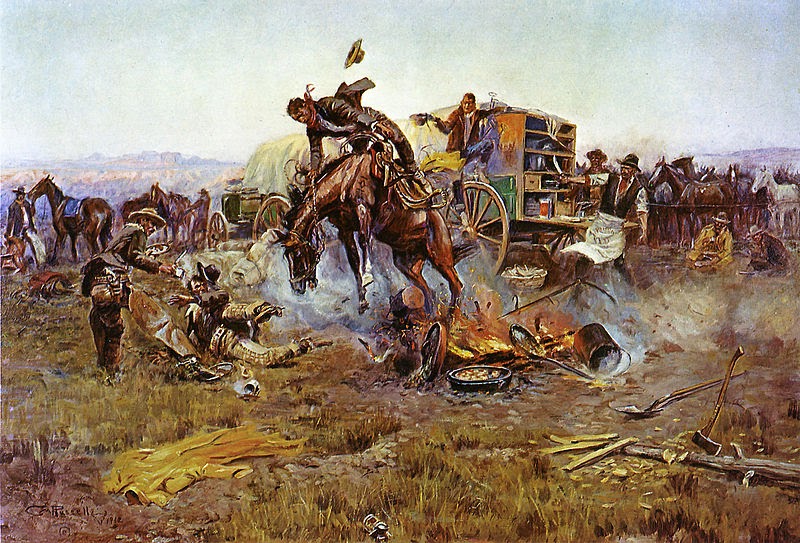 |
| Round Up on the Musselshell, Charles M. Russell, 1919 |
The
last three decades of the 19th Century — 1870 to 1900 — compose the
period most people think of when they hear the term “Wild West.” Prior to the
Civil War, westward expansion in the U.S. was a pioneering movement, and the
period around the turn of the 20th Century was dominated by the
Industrial Revolution. But in a scant thirty years, the American cowboy raised
enough hell to leave a permanent mark on history.
Cowboys
also left a permanent mark on American English. A whole lexicon of new words
and phrases entered the language. Some were borrowed from other cultures. Others
embodied inventive new uses for words that once meant something else. Still
others slid into the vernacular sideways from Lord only knows where.
One
of the best ways to imbue a western with a sense of authenticity is to toss in
a few bits of period-appropriate jargon or dialect. That’s more difficult than
one might imagine. I’m constantly surprised to discover words and phrases are
either much younger or much older than I expected. Sometimes the stories behind
the terms are even better than the terms themselves.
I
keep an ever-expanding cowboy-to-English
dictionary on my website — mostly
so I know where to look when I need a word or phrase, but also because others
sometimes find the material amusing or helpful. Below are a few of the entries
related to food and drink.
 |
| Camp Cook's Troubles, Charles M. Russell |
Ball: a shot of liquor. Originated in
the American West c. 1821; most commonly heard in the phrase “a beer and a
ball,” used in saloons to order a beer and a shot of whiskey. “Ball of fire”
meant a glass of brandy.
Barrel: cheap saloon, often with a brothel attached.
American English; arose c. 1875 as a reference to the barrels of beer or booze
typically stacked along the walls.
Bear sign: donuts. Origin
obscure, but the word was common on trail drives. Any chuckwagon cook who could
— and would — make bear sign was a keeper.
Bend an elbow: have a drink.
Benzene: cheap liquor, so called because it
set a man’s innards on fire from his gullet to his gut.
Bottom of the barrel: of very low
quality. Cicero is credited with coining the phrase, which he used as a
metaphor comparing the basest elements of Roman society to the sediment left by
wine.
Budge: liquor. Origin unknown, but in
common use by the latter half of the 1800s. A related term, budgy, meant drunk.
Cantina: barroom or saloon. Texas and southwestern
U.S. dialect from 1892; borrowed from Spanish canteen.
Chuck: food. Arose 1840-50 in the
American West; antecedents uncertain.
Dead soldier: empty liquor bottle.
Although the term first appeared in print in 1913, common usage is much older.
Both “dead man” and “dead marine” were recorded in the context before 1892. All
of the phrases most likely arose as a pun: “the spirits have departed.”
 |
| Laugh Kills Lonesome, Charles M. Russell |
Dive: disreputable bar. American English
c. 1871, probably as a figurative and literal reference to the location of the
worst: beneath more reputable, mainstream establishments.
Goobers or goober peas: peanuts. American
English c. 1833, likely of African origin.
Grub up: eat. The word “grub” became slang
for food in the 1650s, possibly as a reference to birds eating grubs or perhaps
as a rhyme for “bub,” which was slang for drink during the period. 19th Century
American cowboys added “up” to any number of slang nouns and verbs to create corresponding
vernacular terms (i.e., “heeled up” meant armed, c. 1866 from the 1560s usage
of “heel” to mean attaching spurs to a gamecock’s feet).
Gun wadding: white bread. Origin
unknown, although visual similarity is likely.
Jigger: 1.5-ounce shot glass; also, the
volume of liquor itself. American English, 1836, from the earlier (1824) use of
jigger to mean an illicit distillery. Origin unknown, but may be an alteration
of “chigger” (c. 1756), a tiny mite or flea.
Kerosene: cheap liquor.
(See benzene.)
Mescal: a member of the agave family found
in the deserts of Mexico and the southwestern U.S., as well as an intoxicating
liquor fermented from its juice. The word migrated to English from Aztec via
Mexican Spanish before 1828. From 1885, mescal also referred to the peyote
cactus found in northern Mexico and southern Texas. Dried disks containing psychoactive
ingredients, often used in Native American spiritual rituals, were called “mescal
buttons.”
Mexican strawberries: dried beans.
Red-eye: inferior whiskey. American slang;
arose c. 1819, most likely as a reference to the physical appearance of people
who drank the stuff. The meaning “overnight commercial airline flight that
arrives early in the morning” arose 1965-70.
 |
| The Herd Quitter, Charles M. Russell |
Roostered: drunk, apparently
from an over-imbiber’s tendency to get his tail feathers in an uproar over
little to nothing, much like a male chicken guarding a henhouse. The word “rooster”
is an Americanism from 1772, derived from “roost cock.” Colonial Puritans took
offense when “cock” became vulgar slang for a part of the human male anatomy,
so they shortened the phrase.
Sop: gravy. Another trail-drive word,
probably carried over from Old English “sopp,” or bread soaked in liquid. Among
cowboys, using the word “gravy” marked the speaker as a tenderfoot.
Stodgy: of a thick, semi-solid consistency;
primarily applied to food. Arose c. 1823-1825 from stodge (“to stuff,” 1670s).
The noun form, meaning “dull or heavy,” arose c. 1874.
Tiswin (also tizwin): a fermented
beverage made by the Apache. The original term probably was Aztecan for “pounding
heart,” filtered through Spanish before entering American English c. 1875-80.
Tonsil varnish: whiskey
Tornado juice: whiskey




